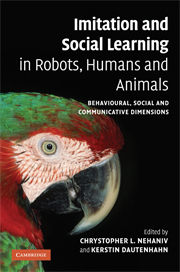 Imitation and Social Learning in Robots, Humans and Animals
Imitation and Social Learning in Robots, Humans and Animals Published online by Cambridge University Press: 10 December 2009
Introduction
We are exploring how primitives, small units of behavior, can speed up robot learning and enable robots to learn difficult dynamic tasks in reasonable amounts of time. In this chapter we describe work on learning from observation and learning from practice on air hockey and marble maze tasks. We discuss our research strategy, results, and open issues and challenges.
Primitives are units of behavior above the level of motor or muscle commands. There have been many proposals for such units of behavior in neuroscience, psychology, robotics, artificial intelligence and machine learning (Arkin, 1998; Schmidt, 1988; Schmidt, 1975; Russell and Norvig, 1995; Barto and Mahadevan, 2003). There is a great deal of evidence that biological systems have units of behavior above the level of activating individual motor neurons, and that the organization of the brain reflects those units of behavior (Loeb, 1989). We know that in human eye movement, for example, there are only a few types of movements including saccades, smooth pursuit, vestibular ocular reflex (VOR), optokinetic nystagmus (OKN) and vergence, that general eye movements are generated as sequences of these behavioral units, and that there are distinct brain regions dedicated to generating and controlling each type of eye movement (Carpenter, 1988). We know that there are discrete locomotion patterns, or gaits, for animals with legs (McMahon, 1984). Whether there are corresponding units of behavior for upper limb movement in humans and other primates is not yet clear.
To save this book to your Kindle, first ensure [email protected] is added to your Approved Personal Document E-mail List under your Personal Document Settings on the Manage Your Content and Devices page of your Amazon account. Then enter the ‘name’ part of your Kindle email address below. Find out more about saving to your Kindle.
Note you can select to save to either the @free.kindle.com or @kindle.com variations. ‘@free.kindle.com’ emails are free but can only be saved to your device when it is connected to wi-fi. ‘@kindle.com’ emails can be delivered even when you are not connected to wi-fi, but note that service fees apply.
Find out more about the Kindle Personal Document Service.
To save content items to your account, please confirm that you agree to abide by our usage policies. If this is the first time you use this feature, you will be asked to authorise Cambridge Core to connect with your account. Find out more about saving content to Dropbox.
To save content items to your account, please confirm that you agree to abide by our usage policies. If this is the first time you use this feature, you will be asked to authorise Cambridge Core to connect with your account. Find out more about saving content to Google Drive.